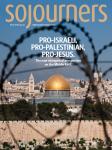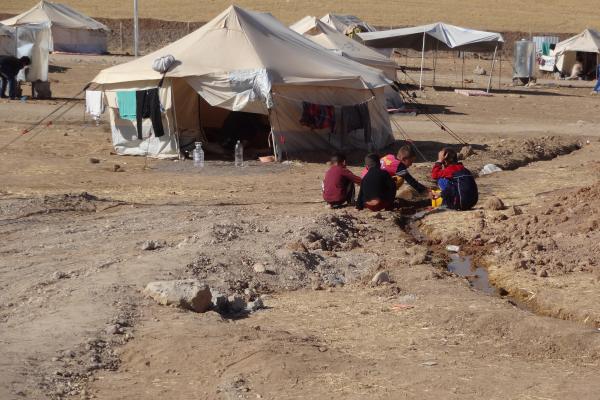REV. KHALIL JAAR is a warm, passionate, and energetic man—and he needs to be. As the spiritual leader and “go to” guy for the 150 Iraqi Christian refugees living in his church in Amman, Jordan, he needs all the energy he can get.
When I met with Father Jaar at St. Mary, Mother of the Church congregation in Amman, it quickly became obvious how much he loves the refugees who now call this church home. Jaar, himself a refugee, knows something about the trials and tribulations of being forced to leave your home. He is the son of Palestinian refugees of Honduran descent. (His birth name is Carlos and he took the name Khalil when he became a Catholic priest.) He also knows something about the terror of war. Shortly after the 2003 U.S. invasion of Iraq, he was abducted in Baghdad where he was serving, and “only by the grace of God was I freed,” he says.
Jaar is especially dedicated to the education of the Iraqi children forced to leave everything they knew, including their schools. In his overcrowded office, full of stacks of papers and files, Jaar pulls out a large binder. This is his personal reference book, with a page for each child in his care. It includes a photo, a short history of their family and background, their education to date, and also notes about their extracurricular activities and likes, such as soccer and music. It is important to know as much as possible about each child, he says, and make sure that they continue their education.
The Iraqis who have been arriving at St. Mary’s since spring 2014, escaping the onslaught of ISIS, often come with nothing but the clothes on their backs. They have been traumatized and overwhelmed by their losses of possessions, home, and community. The children, while resilient and adapting to their new lives, carry the scars of being terrorized. They witnessed extreme cruelty by ISIS soldiers and watched as their friends and neighbors turned against one another. One little girl had her ear sliced open when a militant yanked her earring out, saying it was against Islam to wear jewelry. A small boy had a bottle of milk violently knocked out of his hand; he was told they were permitted to take nothing as they were marched out of their village.
Father Jaar is sensitive to how much these children have suffered and does all he can to make them feel safe and secure in their temporary home. He continually reaches out to the community to provide food, mattresses, clothes, and the basic necessities of life. The refugees, in turn, do as much as they can to help, cleaning the church’s common rooms that they share and cooking meals in the small church kitchen. Jaar says they often opt to eat more vegetables and less meat as a way to keep costs down. They are aware of the generosity of parishioners and the wider community, and they want to do all they can to make themselves less of a burden. To this, Jaar says, “We do not consider them refugees, but guests.”
Slowly the Iraqis, as well as other Syrians and Palestinians, are moving to nearby apartments that have been rented by the church. It’s crowded, with two or three families sharing each apartment, but it offers more privacy than sleeping on floor mats in the church. They are waiting to be granted asylum, a process that may take years.
“We don’t know how many days or months they will stay with us,” says Jaar, “and that is why any kind of help is welcome.” This is when a strong faith is needed, and Jaar is a man of strong faith. As I prepare to leave, he shares one more story of a moment when they were in dire need of supplies for another new group of refugees, and a truck arrived that same day bearing contributions from a local Christian businessperson. A broad smile lights up his face at the memory, and he says, “God always provides.”

Got something to say about what you're reading? We value your feedback!
